Deleted Scenes from the Bestselling Utopian Book Review
Celebrating Vanya Bagaev's rebellious work of experimental fiction.
“The main concept is, in the northern island of Novo Tsarstvo, a government-pronounced utopia, existed a well-known bestselling novel. Some scenes, however, did not comply to the utopian standards and were deleted and presented as a report to the chief censor.”1
—Vanya Bagaev
Part I: The Book Review
When I ordered Deleted Scenes from the Bestselling Utopian Novel online, I was expecting a book. What I received was a transformative experience. To be deeply moved by a work of art is a gift, and to experience this as the real circumstances reflected by the work persist is somewhat rare. Readers who enjoy poetics, humor, and experimental forms will revel in this timely piece of fiction by up-and-coming author Vanya Bagaev.
The setting in which Deleted Scenes takes place, Novo Tsarstvo, is the “twisted twin sibling of contemporary Russia after the invasion of Ukraine” (Bagaev). As I write this the war rages on, as do armed conflicts globally. Authoritarianism tightens its grip on civilization at large, and many are struggling to remain hopeful. At times like this, creative work offers comfort. Art can soothe what is too painful to comprehend by transmuting suffering into aesthetic beauty, cathartic humor, and transportive storytelling. It can also unmask reality and help the audience understand and be understood. Deleted Scenes accomplishes both, and does so with a strong sense of artistic freedom that resonates with the story’s powerful themes of resilience.
Bagaev takes significant risks in his execution of the work. He obliterates the rules when it comes to narrative voice, point-of-view, and character development. Poetic prose is employed throughout, but is accompanied by simple language and humor that creates dynamic, engaging writing that does not fatigue the reader. Scenes are often interrupted by abrupt voids or dense displays of text art where the deleted scenes once were. The form is so unconventional that it is difficult to say with certainty whether the book can be considered a novel.
Experimental forms are not unprecedented. Authors such as Mark Z. Danielewski, with his bestselling novel House of Leaves, have already broken significant ground in this area. However, experimental forms have not been broadly adopted by readers and writers. Books that embrace this level of creative freedom are relatively rare and it is understandable why. Readers tend to have strong expectations for storytelling and struggle with subversion. The good news for fans of traditional storytelling is that Deleted Scenes is no House of Leaves and though unconventional, Bagaev offers much more to readers in terms of coherence and structure.
The book is divided into two parts that are directly related but not fully integrated. Vanya refers to Part I as “the novella.” This breathtaking 130-page story offers a strong introduction, inciting incident, and series of events that lead to a climax. The series of events, often referred to as “fun and games” by those who are familiar, is played much more freely than what is typical. Character development is collective rather than individual. Point of view is fluid, and there are sections which are are written entirely in dialogue, much like a play, where point of view is entirely absent. Some of that dialogue occurs between personified thoughts. These conversations bring to life the cognitive dissonance one can experience, particularly in regard to moral responsibility, in the face of oppression and extreme violence.
—What do you propose? Sit back on the sofa, chill, and watch them beat, torture, and imprison our friends and neighbors? (Deleted Scenes, p. 26)
Despite the serious nature of the dialogue, these sections are often funny and provide comedic relief from the intensity of the material without coming across as frivolous or tangential. The commentary is sometimes interrupted by Bagaev himself, who breaks the fourth wall as the writer, rather than as a character or narrator. When the action continues, there is a sense of continuity. Even though the narrative is disjointed, the author creates cohesion with strong themes, repetition, and a sense of tension that builds throughout and culminates in a tragic, yet satisfying climax.
Part II in its own weird, wonderful way is perhaps the longest denouement I have come across. It is comprised of the deleted scenes from the Part I, which Vanya has removed and placed at the end in a series much like a collection of short stories. If the book is read cover to cover like a novel, this part of the book suffers from a “second act slump,” which is a highly common pacing issue plaguing even the most celebrated written works. However, it is not difficult for the reader to regain momentum, as these interrelated stories take place in the same setting as the novella and are carefully arranged into an arc which culminates in the final story. The last chapter reads like an alternative, almost happy ending.
Vanya Bagaev’s Deleted Scenes from the Bestselling Utopian Novel is not only a gift to the oppressed but to the observer. It is a forceful call to turn toward what matters and a brave stand against apathy and despair. It is also an aesthetic piece of art that can be admired for its beauty, which provides generous conventional framework to support the rich poetics, text art, and experimental narrative play which stimulate the imagination and invite the reader to revel in all that is possible.
Part II: The Deleted Scenes
(From ‘The Bestselling Utopian Book Review’)
My favorite line from the book is “You are the stroke this world is having.”
Depictions of violence contained within the book are brutal, but are delivered through a lens of innocence, sensitivity, and empathy. As a survivor of homicide and a family member’s suicide, I experienced profound emotional release while reading the book. Many dissociate from extreme levels of suffering, but Vanya’s unwavering stare at brutality did to me what great art of this nature can do: it has unsutured emotional wounds and created opportunities for more complete healing.
Vanya’s poetic prose has strong musicality, and I was impressed by how music and noise were represented in some instances by text art.
I would love to see this book adapted for stage. So much about it reminded me of an experimental theater company I used to work with called The Imaginists Theatre Collective, who (a decade ago) coincidentally created a character much like the character TVR depicted on the cover and on page 47:
I have been forever changed by reading Deleted Scenes from the Bestselling Utopian Novel. Maybe you will be too.





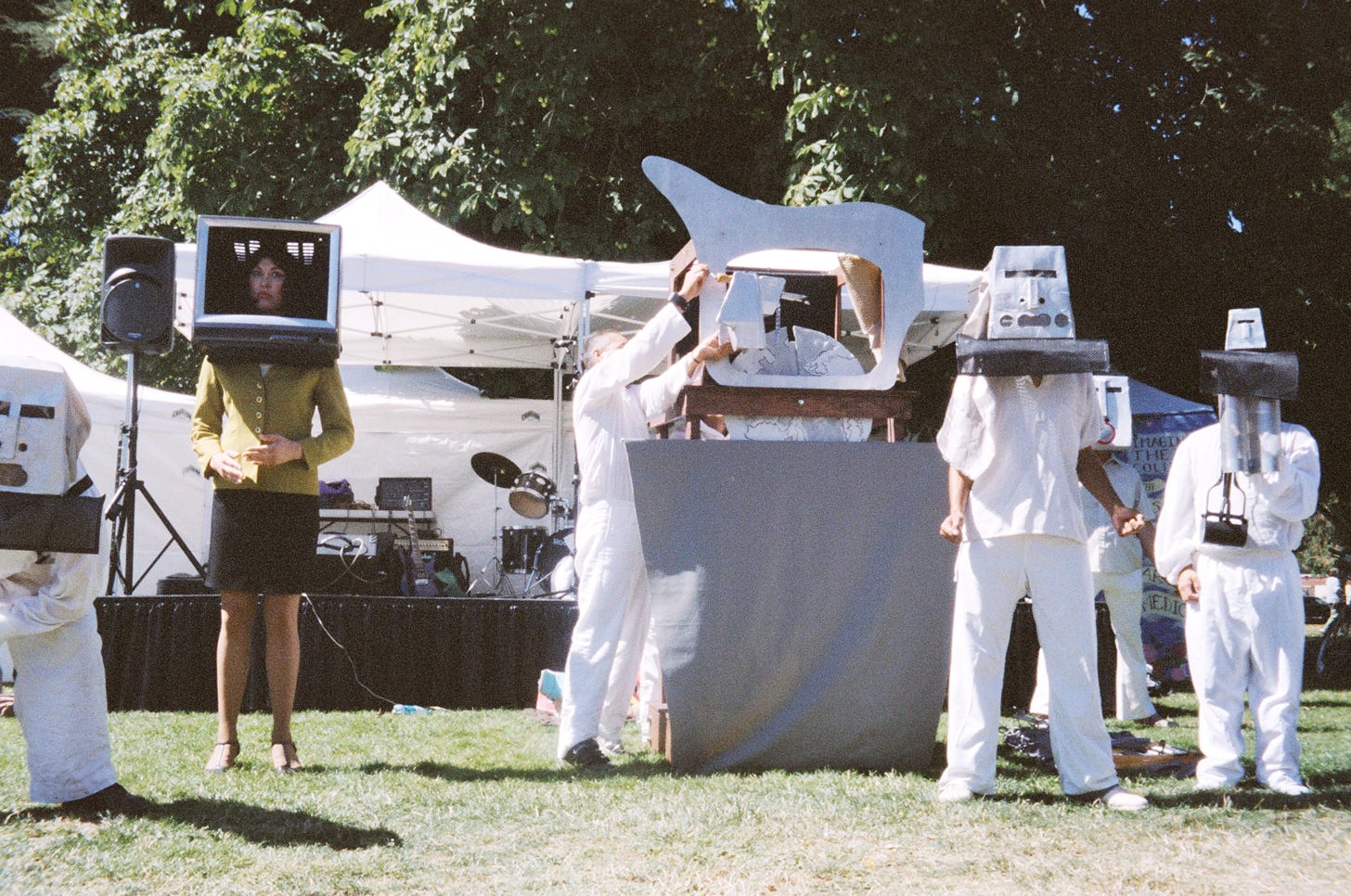
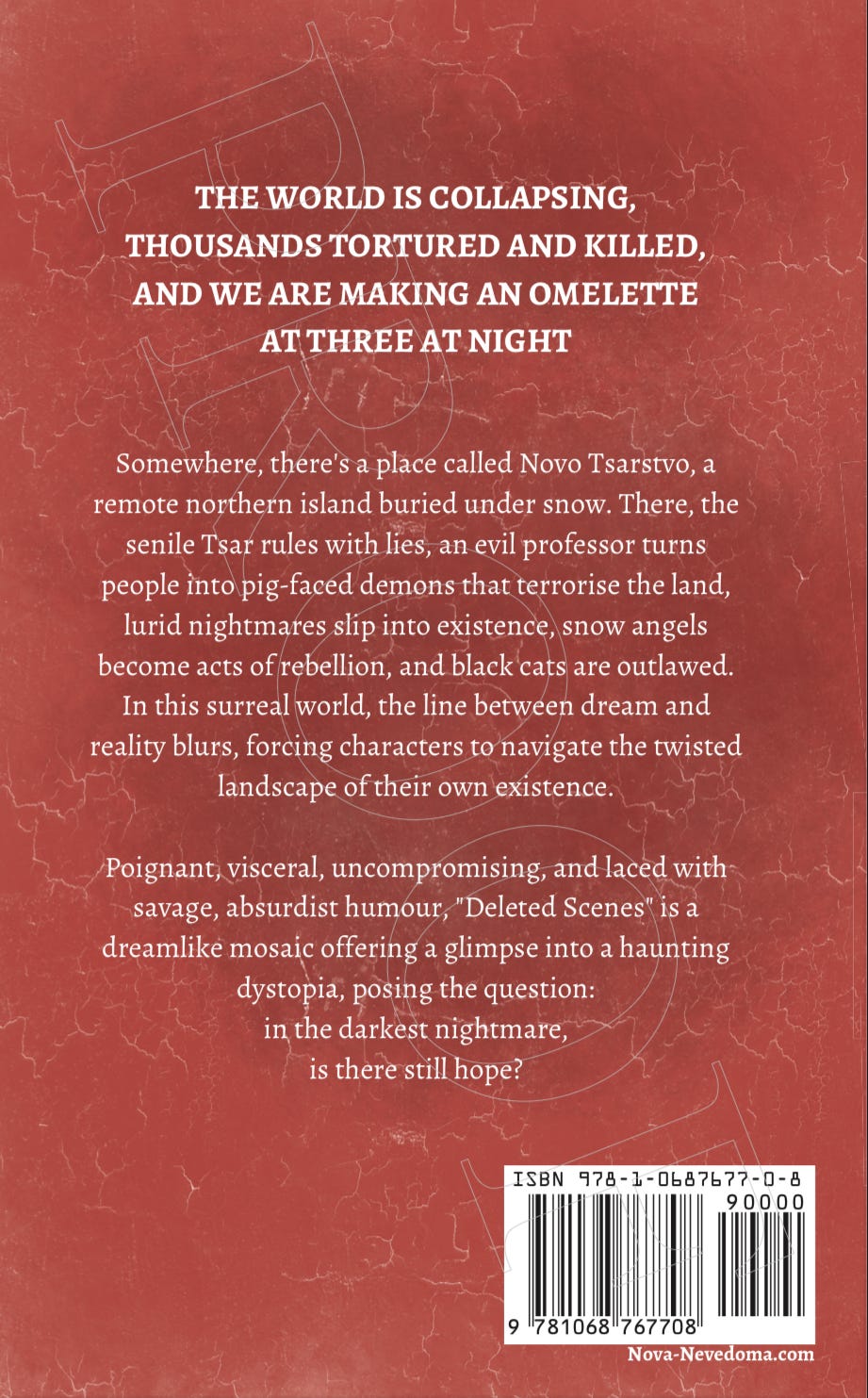
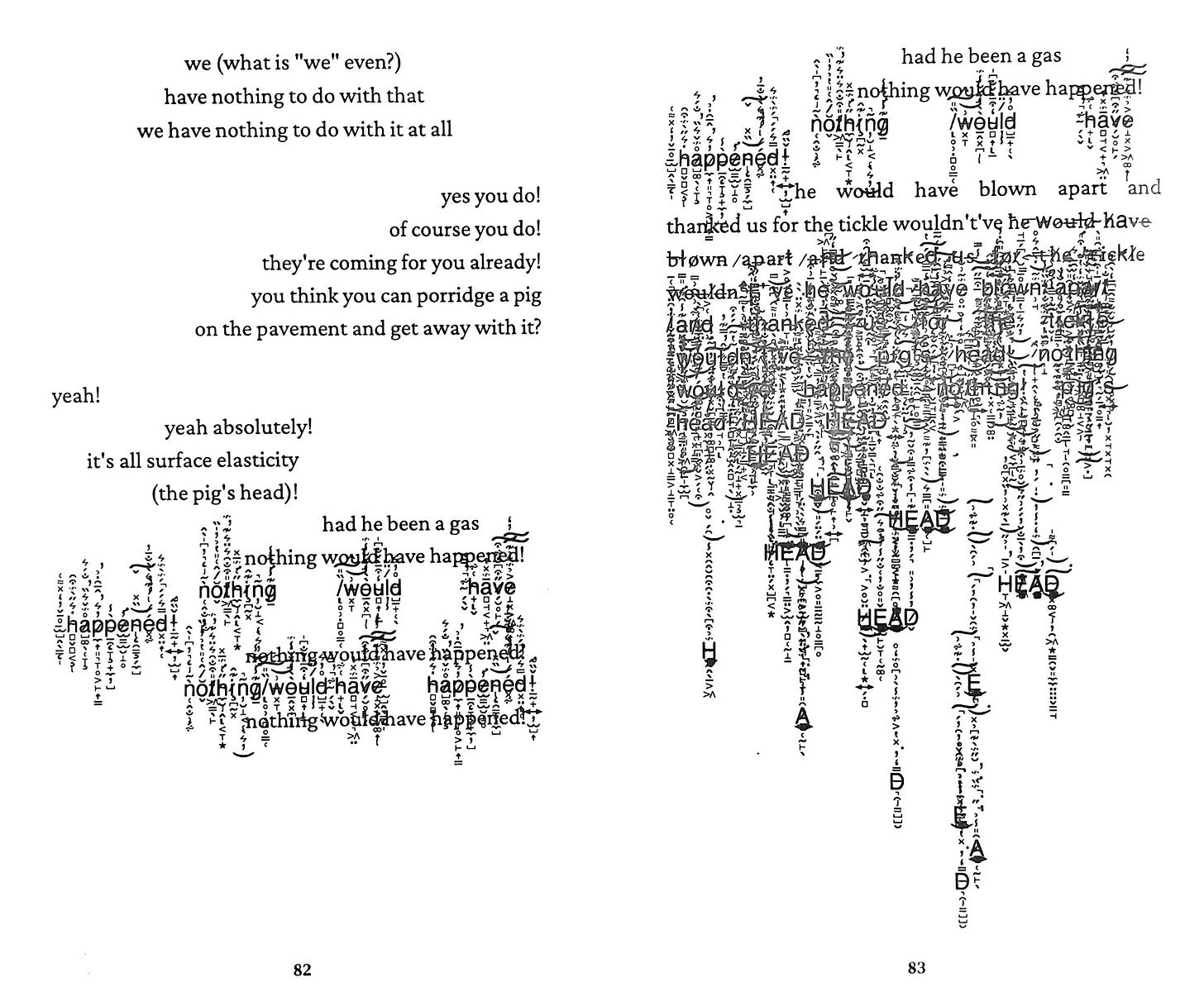
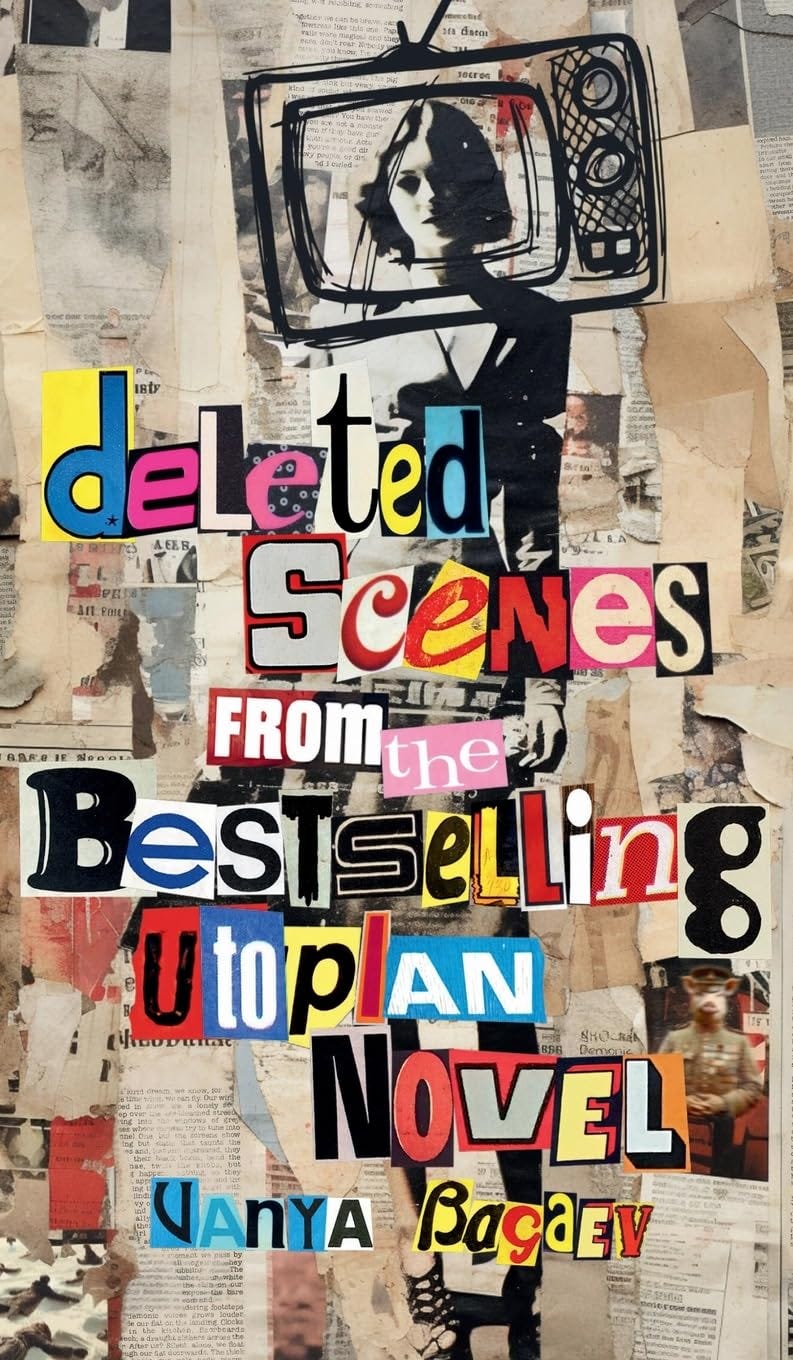
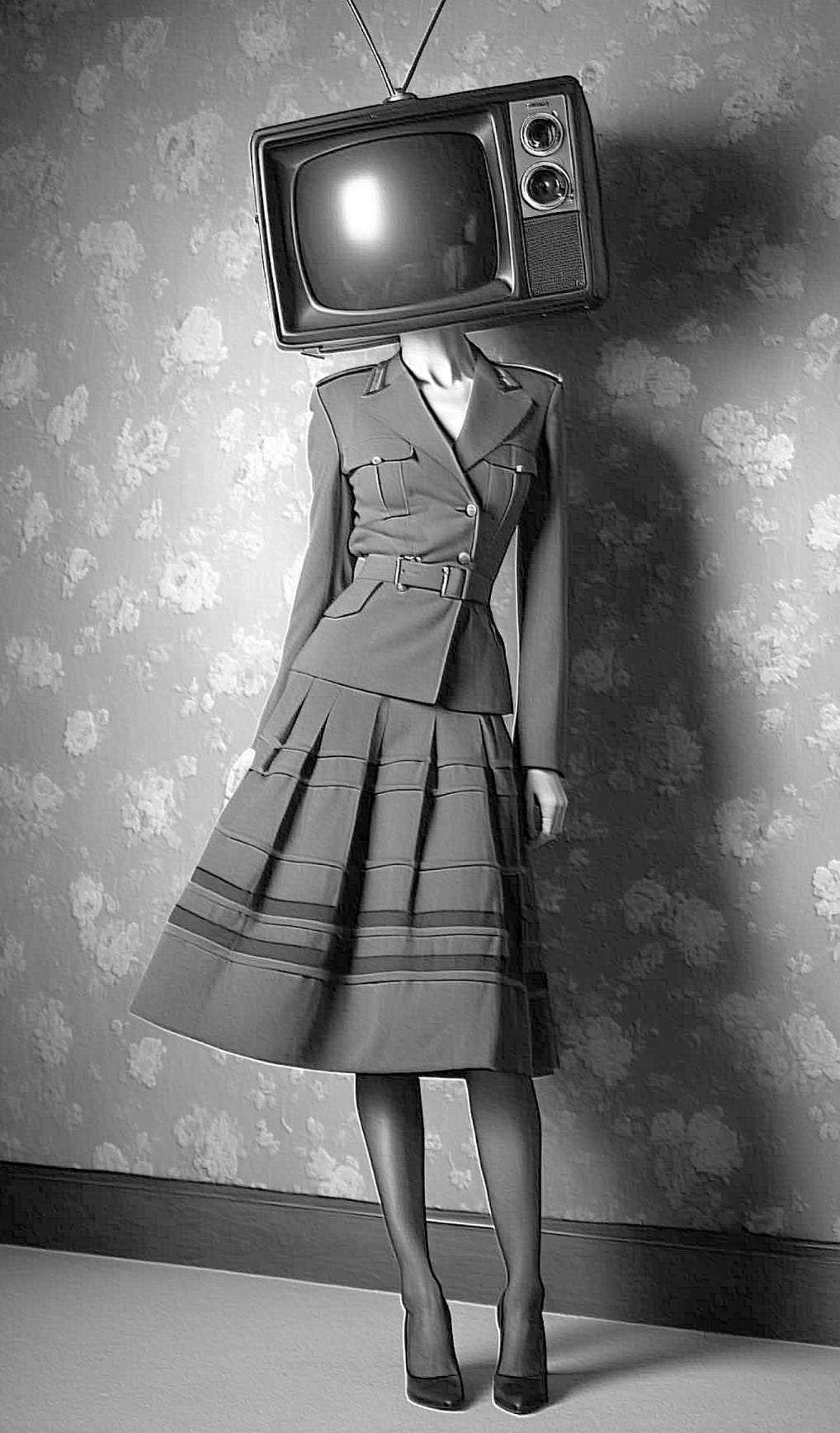
You’ve inspired me to read this book. I just bought it!
Excellent piece, Annie. You filled my tank up and now I am ready to read this book!